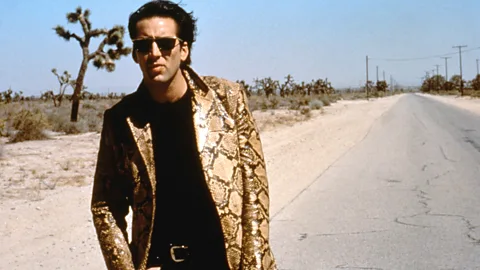Why Nicolas Cage is Hollywood's most misunderstood star
 Alamy
AlamyIn new film The Unbearable Weight of Massive Talent, Cage plays himself and pokes fun at his OTT persona. But his genuine greatness should not be forgotten, writes Anna Bogutskaya.
Is Nicolas Cage a good or bad actor? This question might be a Schrödinger's cat of pop culture. In an episode of the US sitcom Community, trying to find the answer to this cosmic-sized query almost drives Abed Nadir mad. On the one hand, he has an Oscar, for 1995's Leaving Las Vegas and has worked with everyone Martin Scorsese to David Lynch and Werner Herzog. And on the other, since the 2010s, his name has become synonymous with direct-to-streaming action films that are low on plot and high on explosives, while causing critics to scoff and fuelling an ironic online fandom propelled by YouTube clip compilations with titles such as "Nicolas Cage freak outs".
More like this:
Every few years, though, he gives a performance that makes the world reconsider him yet again: his understated performance as an ex-criminal in Joe (2013), his depiction of petrifying, guttural grief in Mandy (2019) or, most recently, his heartbreaking turn as a man on a mission to recover his beloved truffle pig in Pig (2020). Every time, despite the acclaim he has received throughout his career, reviewers somehow seem surprised at what he is capable of.
 Alamy
AlamyThis time, the film putting him back into critical favour is the buddy action-comedy The Unbearable Weight of Massive Talent, where Nicolas Cage takes on the most unusual, and certainly most meta, challenge of his career yet. He stars as "Nick Cage", a fictionalised version of himself, a frustrated movie star who is one rejection away from retiring from acting and living the life of a housecat. This Cage is an eager cinephile who wants to talk incessantly about The Cabinet of Doctor Caligari, and finds an unlikely kinship with a Cage mega-fan (played by Pedro Pascal) who has paid him $1 million to appear at his birthday party – only to then find out this irer of his is a notorious drug lord.
If it's a tricksy conceit, then The Unbearable Weight of Massive Talent is nothing too challenging: it ingests the Cage-mania that has permeated the internet for the last decade or so and transforms it into an accessible bromance that doesn't overindulge in too much complicated meta-ness but instead lets him poke fun not at himself, exactly, but at the outsized, eccentric persona that audiences will have front of mind. One of the film's inbuilt jokes, playing on a core aspect of Cage's appeal, is the promise that he might do something kooky or wild at any given moment: turn around and pull a face until his eyes bulge unnaturally, or suddenly raise his voice. As Megan Mitchell, co-founder of Cage-themed film festival Cage-a-rama, describes, it's that "Cage element. Anything could happen at any time."
Why he is one-of-a-kind
As a movie star, Cage is nothing if not unique. He emerged before the age of celebrity obsession took hold, but is now embraced by online "stan" culture. He is associated with both high and low art; he is both serious about his craft and self-aware about his star image. There are more than 20 podcasts dedicated to dissecting the actor's career; a subreddit r/onetruegod that collects all things Cage; film festivals that only show Cage films in Europe and the US; and a new book, Age of Cage, that serves to explore the changing history of Hollywood through a Cage prism.
Filmmakers and fellow actors have been reverential about him. Lynch, who directed him in 1990's Wild at Heart, called Cage "the jazz musician of American acting". Guillermo del Toro recently tweeted that "there has not been, nor will there ever be an actor like Nicolas Cage. A master". Scorsese, who directed him in Bringing Out the Dead, described his acting style as "almost like silent film, like Lon Chaney". Ethan Hawke effused that Cage is "the only actor since Marlon Brando that's actually done anything new with the art".
But this adoration still doesn't quite explain the intensity of Cage's cult following. Is it because he is part of a dying breed of a certain kind of unknowable movie star we don't see much of anymore? The best kind of human meme? Just a really good actor? Or all of the above?
